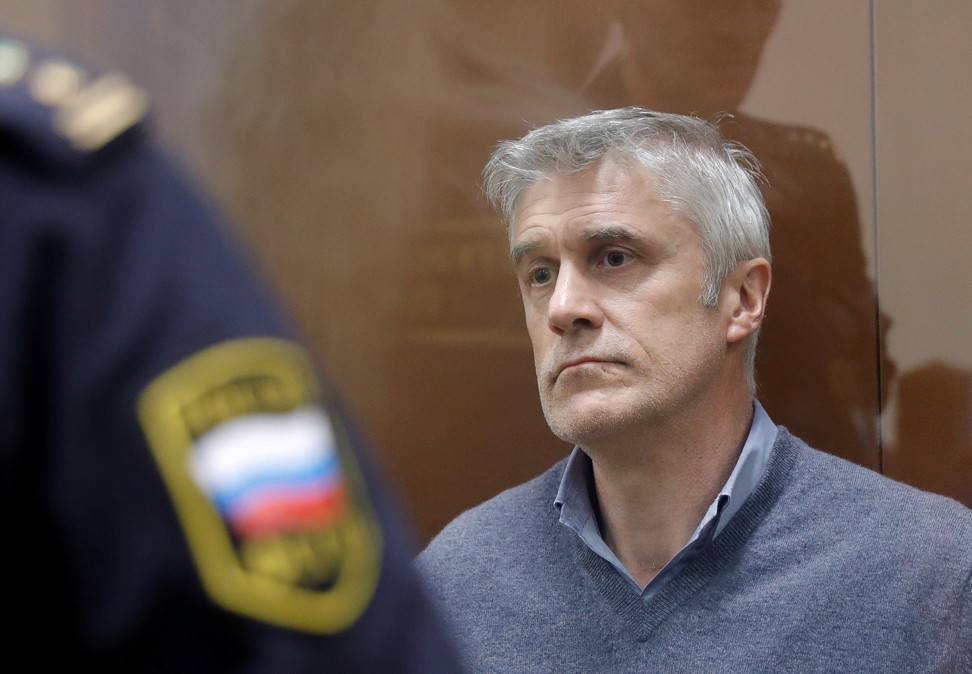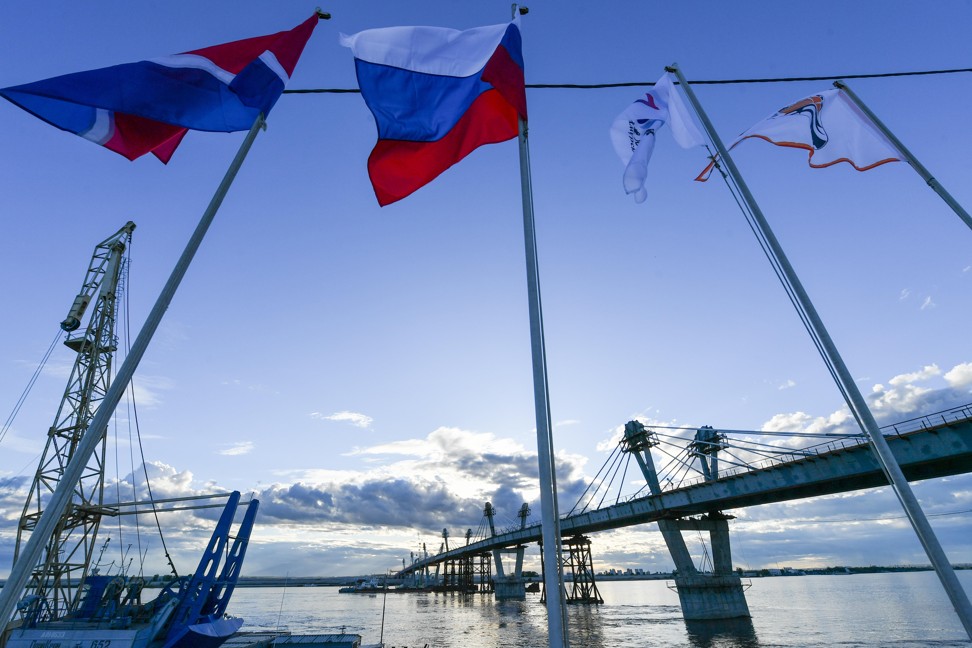
China and Russia seek closer economic ties to counter US pressure as Xi Jinping prepares to meet Vladimir Putin
- The two leaders are expected to meet in Moscow on Wednesday, a day before the start of the St Petersburg Economic International Forum
- In the midst of mutual tensions with the US, trade between the two countries last year rose 24.5 per cent largely due to greater Russian energy exports to China

The deepening of the economic alliance between Russia and China will be high on the agenda as President Xi Jinping meets Russian President Vladimir Putin in Moscow on Wednesday amid their mutual estranged relations with the United States.
Xi and Putin are both then due to attend the annual St Petersburg Economic International Forum, Russia’s flagship international investor forum that expects more than 1,000 representatives from China, starting on Thursday.
The US, however, is expected to miss the event after its former envoy to China and current ambassador to Russia, Jon Huntsman, said he would not attend to protest Moscow’s prosecution of Baring Vostok private equity group founder Michael Calvey. The American investor has been accused by Russian authorities of embezzling 2.5 billion roubles (US$38 million) from the Vostochny Bank.
Calvey, who denies the charges, has asked prosecutors to be allowed to attend the forum having been released to a restrictive form of house arrest in April after spending two months in pre-trial detention.

In the midst of its trade war with the US, China has been working to strengthen its ties with Russia in multiple spheres.
Given extended US and European Union sanctions against its officials and organisation for its annexation of Crimea from Ukraine, Russia also has reason to forge closer ties with China.
But some experts believe the scale of cooperation remains limited, with Chinese investment in Russia falling despite an increase in bilateral trade largely due to Russian energy exports to China.
“There will be some limited steps to make up for deteriorating relations with the US,” said professor Ivan Tselichtchev, faculty dean at the Niigata University of Management in Japan.
China’s direct investment in Russia fell sharply in the first half of 2018, according to Russia’s central bank, with the total volume dropping 24 per cent.
There will be some limited steps to make up for deteriorating relations with the US
According to the Central Bank of Russia, the outflow of Chinese investments continued for four consecutive quarters.
For the first half of 2018, Chinese investment in Russia made up of just two-thirds of what it was before the annexation of the Crimea, roughly around US$4.54 billion.
The decline in investment has prompted widespread speculation in Russian media that Chinese companies have been supporting US sanctions against Moscow.
“The usual business investment in Russia [from Chinese companies] is not growing at a fast pace,” added Tselichtchev who also studies the influence of Russia in Asia.
“Chinese businesses and investors feel quite cautious about the investment environment in Russia. There are investments here and there in hi-tech. These are interesting, but the scale is not large at this point.
“Some people in Russia seem to have been hoping that Chinese investment could and would make up for the decline in investment from developed countries. This is not happening, at least at this point.”
Despite weak Chinese investment, trade between the two countries last year rose 24.5 per cent to a record US$108 billion largely due to greater Russia oil and gas exports, which made it China’s largest energy supplier.
“Strengthening cooperation in the field of oil and gas confirms Vladimir Putin’s main foreign policy course, in which the strategic partnership or alliance with China is aimed at the US,” said Grzegorz Kuczyski, an expert in Russia and energy at the Warsaw Institute, an independent think tank that focuses on geopolitics.
A further strengthening of economic ties is likely to take place at several governmental levels, led by state-owned or controlled companies, according to analysts, with state-owned Russian energy firms Rosneft and Gazprom having already struck major deals with China in the last few years.
“The Chinese market has become an important path of cooperation for several Russian oligarchs and corporations close to the Kremlin,” added Kuczyski.
Under China’s Belt and Road Initiative to boost trade, China invested 2.58 billion yuan (US$373 million) in building its part of a bridge over the Amur River to link Heihe in Heilongjiang province and Russian city of Blagoveshchensk, which could further facilitate transport of agriculture products from Russia to China, observers said.
In response to the escalation of the trade war, China has significantly reduced its imports of liquefied natural gas from the US over the past few months.
Only two vessels have made the trip from the US to China – one in January and one in February – versus 14 during the first four months of 2018 before the start of the trade war, according to Refinitiv Eikon shipping data last month.

“There will be a big gap in the Chinese market left by [the absence of] US products due to the trade war, and who fills that gap? I think Russia would be China’s first priority,” said Shi Ze, a senior research fellow at the China Institute of International Studies in Beijing.
Shi, a former Chinese diplomat in Moscow, said the Yamal LNG project, in which state-owned China National Petroleum Corporation owns a 20 per cent stake and the state-owned investment fund, Silk Road Fund, owns 9.9 per cent, had been seen as breakthrough in trade ties between China and Russia.
“It’s not simply selling and buying, but an integrated cooperation in which Chinese companies are now playing a role in the upper end of the [supply] chain in Russia,” added Shi.
“The Power of Siberia gas line, which will deliver gas to China later this year, will also consolidate energy cooperation between the two countries.”
Observers said that Xi and Putin both support multilateral cooperation and so would seek to coordinate their policies in organisations such as the World Trade Organisation and Group of 20, an international forum for the governments from 19 countries, including China, Russia and the US, as well as the European Union.
“As great powers, China and Russia have the responsibility to defend global stability … in the face of growing challenges from unilateralism as well as terrorism and global security, especially since the US has withdrawn from the Intermediate-range Nuclear Forces treaty,” Shi said.